Transform your kitchen into a mental wellness sanctuary with these therapeutic baking tips. Start by mindfully selecting ingredients, focusing on aromatic spices and mood-enhancing foods. Engage in rhythmic kneading to release tension and practice deep breathing. Let baking scents create a soothing atmosphere, combining fragrances like vanilla and cinnamon. Express creativity through decorating, allowing artistic expression to boost your mood. Practice precision in measuring and timing to cultivate focus and patience. Incorporate gratitude, savoring each step of the process. Embrace slow baking techniques, fully engaging your senses during tasting. Finally, share your creations to spread joy and foster connections. Discover how these simple practices can profoundly impact your well-being.
Mindful Ingredient Selection
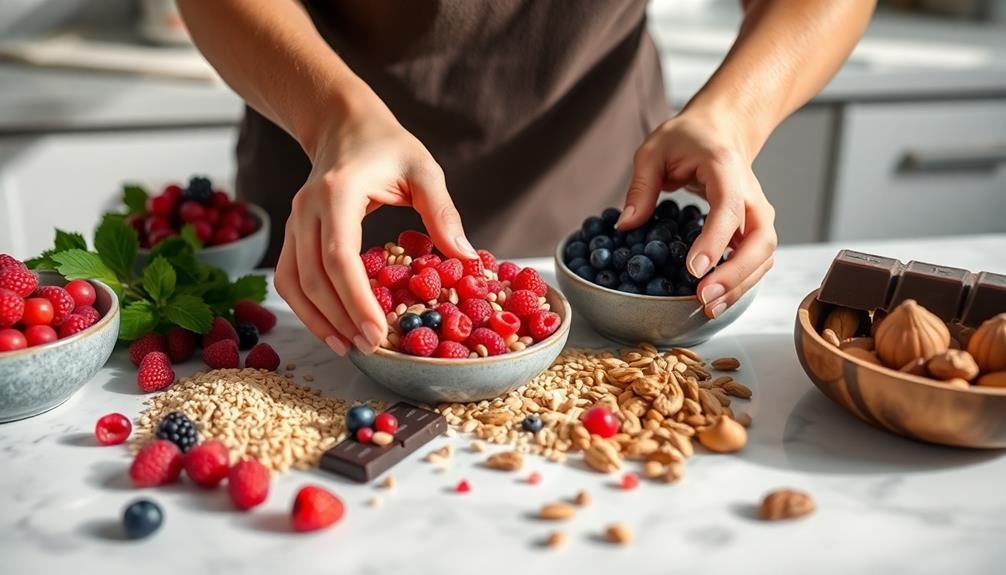
Ingredients are the foundation of any baking endeavor. When selecting them for therapeutic baking, focus on items that engage your senses and promote well-being. Choose aromatic spices like cinnamon, nutmeg, or vanilla to stimulate your olfactory system and evoke positive memories.
Opt for colorful fruits and vegetables to add visual appeal and boost your mood through their vibrant hues. Consider incorporating mood-enhancing ingredients such as dark chocolate, which contains compounds that can improve your state of mind.
Nuts and seeds provide essential nutrients that support brain health, while whole grains offer a satisfying texture and sustained energy release. Don't forget about herbs like lavender or chamomile, known for their calming properties.
As you select your ingredients, be mindful of their origins. Choose locally sourced or organic options when possible, connecting you to your community and environment.
Pay attention to textures, temperatures, and weights as you handle each item. This sensory engagement can help ground you in the present moment and reduce stress.
Rhythmic Kneading for Stress Relief
Engage in the rhythmic process of kneading dough to release physical tension and calm your mind.
As you work the dough with your hands, focus on the repetitive motion, allowing it to become a meditative practice.
Sync your breathing with the kneading movements, inhaling as you push the dough away and exhaling as you fold it back towards you, creating a harmonious flow between your body and the baking process.
Physical Tension Release
Kneading dough offers a powerful way to release physical tension and stress. As you work the dough with your hands, you're engaging in a repetitive motion that can help loosen tight muscles, especially in your arms, shoulders, and upper back. This physical activity encourages blood flow and releases endorphins, which can improve your mood and reduce feelings of anxiety.
To maximize the tension-releasing benefits of kneading, focus on your body's sensations. Pay attention to the pressure you're applying and how it feels in your muscles. If you notice areas of tightness, adjust your kneading technique to target those spots. You can vary the intensity by using more or less force, allowing you to customize the experience to your needs.
As you knead, take deep breaths and synchronize them with your movements. This mindful approach can enhance the calming effects and help you stay present in the moment.
Meditative Repetitive Motion
Beyond its physical benefits, rhythmic kneading can serve as a powerful meditative practice. As you work the dough, focus on the repetitive motion of your hands and fingers. This rhythmic action can help calm your mind and induce a state of flow, similar to meditation. Pay attention to the texture of the dough as it changes beneath your palms, allowing your thoughts to settle on the present moment.
You'll find that this mindful kneading can reduce stress and anxiety by redirecting your focus away from worries and onto the task at hand. The steady, consistent motion of kneading creates a soothing rhythm that can lower your heart rate and promote relaxation. It's an excellent opportunity to practice deep, controlled breathing in sync with your movements.
As you continue kneading, you may notice a shift in your mental state. Embrace this tranquil space and use it to process emotions or simply enjoy the peace it brings. The meditative aspect of kneading can improve your overall mood and provide a sense of accomplishment.
Breathing With Kneading
While kneading dough, synchronizing your breathing with the rhythmic motion can considerably enhance stress relief. As you push the dough away, take a deep breath in through your nose. When you fold the dough back towards you, exhale slowly through your mouth. This coordinated breathing technique helps oxygenate your body and calms your nervous system.
Focus on maintaining a steady rhythm as you knead and breathe. You'll notice your mind becoming clearer and more centered on the present moment. This practice combines the benefits of mindfulness meditation with the physical activity of baking, creating a powerful stress-reduction technique.
As you continue this rhythmic kneading and breathing, you may find your muscles relaxing and tension melting away. The repetitive motion, combined with controlled breathing, can lower your heart rate and blood pressure, promoting a sense of calm and well-being.
Don't rush the process. Take your time to fully experience the therapeutic effects of this practice. You're not just preparing dough; you're engaging in a form of moving meditation that nurtures both your culinary creation and your mental health.
Aromatherapy Through Baking Scents
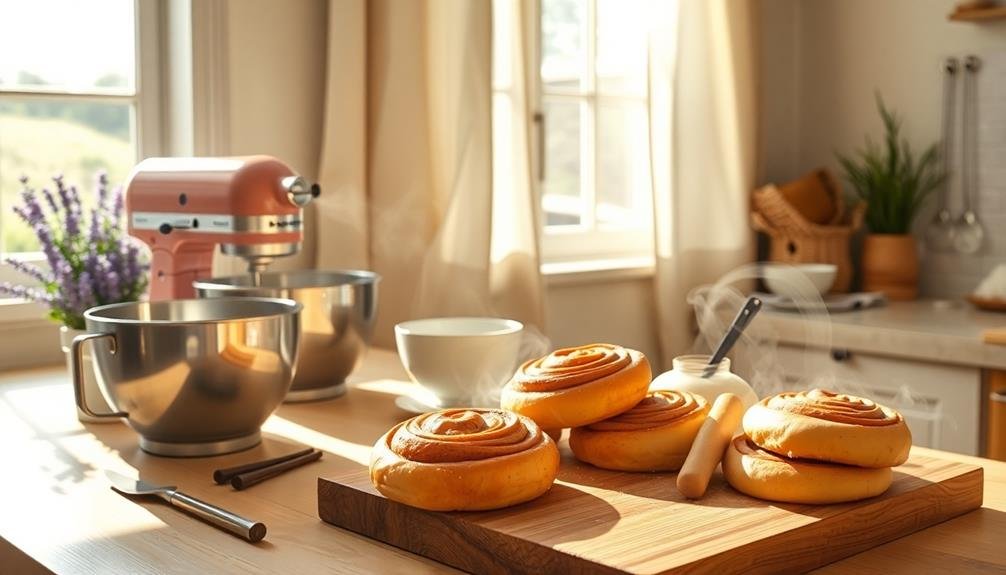
You'll find that baking offers more than just tasty treats; it's a gateway to aromatherapy.
As you create your favorite recipes, you're surrounded by calming fragrances that can soothe your mind and lift your spirits.
Calming Fragrances While Baking
One of the most powerful aspects of therapeutic baking is the aromatic experience it provides. As you bake, you'll encounter a range of calming fragrances that can greatly impact your mood and mental state.
Vanilla, for instance, is known for its ability to reduce stress and anxiety. When you're baking with vanilla extract or vanilla beans, take a moment to inhale deeply and let the soothing scent wash over you.
Cinnamon is another aromatic powerhouse in the kitchen. Its warm, comforting smell can help alleviate feelings of depression and boost cognitive function. As you sprinkle cinnamon into your baked goods, let its aroma envelop you.
Lavender, while less common in baking, can be incorporated into cookies or cakes for its renowned relaxation properties. The scent of lavender can lower heart rate and blood pressure, promoting a sense of calm.
Don't forget about citrus fragrances like lemon or orange zest. These bright, uplifting scents can improve your mood and increase mental clarity. As you grate citrus peels, pause to appreciate their invigorating aroma.
Mood-Boosting Scent Combinations
Combining different scent while baking can create powerful mood-boosting effects, enhancing the therapeutic benefits of your culinary experience. By strategically pairing complementary aromas, you'll maximize the positive impact on your mental well-being. Consider these mood-boosting scent combinations:
| Scent Combination | Mood Effect |
|---|---|
| Vanilla + Cinnamon | Comforting, Relaxing |
| Lemon + Rosemary | Energizing, Focusing |
| Lavender + Orange | Calming, Uplifting |
| Peppermint + Chocolate | Invigorating, Joyful |
| Apple + Nutmeg | Nostalgic, Cozy |
To incorporate these combinations, try adding vanilla extract and cinnamon to your cookie dough, or infusing lemon zest and rosemary into your bread recipe. For cakes, experiment with lavender-orange frosting or peppermint-chocolate ganache. When baking pies, combine apple filling with a nutmeg-spiced crust.
As you bake, pay attention to how these scent pairings affect your mood. You might find that certain combinations work better for you than others. Don't be afraid to experiment and create your own unique blends. Remember, the goal is to enhance your baking experience and boost your mental wellness through the power of aromatherapy.
Creativity in Decorating
Artistic expression flourishes when you decorate your baked creations. It's a chance to let your imagination run wild and infuse your personality into every treat.
Decorating isn't just about making your baked goods look pretty; it's a form of mindfulness that can boost your mood and reduce stress. As you focus on intricate designs or bold color combinations, you'll find yourself fully immersed in the present moment.
Don't be afraid to experiment with different techniques and tools. Try piping, fondant work, or even edible paint to bring your vision to life.
Remember, perfection isn't the goal – it's about enjoying the process and expressing yourself. If you're feeling stuck, look for inspiration in nature, art, or your favorite books and movies.
Here are some creative decorating ideas to get you started:
- Use fresh flowers or herbs for a natural, elegant touch
- Create a themed design based on your favorite book or movie
- Experiment with unconventional color combinations
- Try texture techniques like ruffles, rosettes, or basketweave patterns
Focused Measuring and Precision
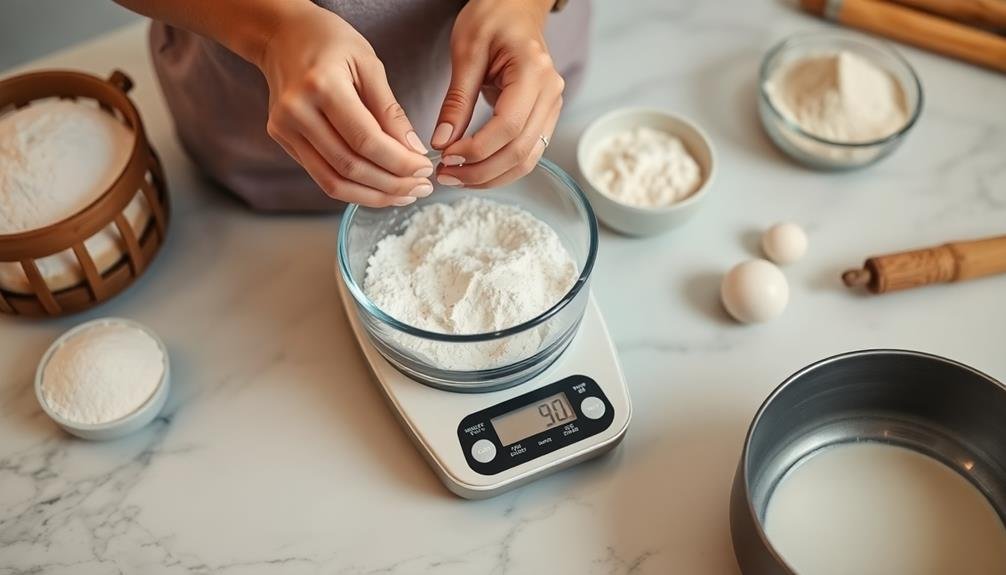
As you shift your attention to the precision aspects of baking, you'll find therapeutic benefits in mindful ingredient portioning, precise timing techniques, and accurate temperature control.
These elements require your full concentration, helping to quiet mental chatter and promote a sense of calm.
Mindful Ingredient Portioning
Precision in baking isn't just about achieving the perfect texture or taste; it's a mindfulness exercise that can promote mental wellness.
When you portion ingredients mindfully, you're practicing focus, patience, and attention to detail. These skills can transfer to other areas of your life, helping you manage stress and anxiety.
To practice mindful ingredient portioning, try these techniques:
- Use all your senses: Feel the texture of flour as you scoop it, listen to the sound of sugar crystals hitting the bowl, and observe the color changes as you mix ingredients.
- Breathe deeply: Take slow, deliberate breaths as you measure each ingredient, staying present in the moment.
- Appreciate each component: Consider the role of each ingredient and how it contributes to the final product.
- Take your time: Don't rush through the measuring process; savor each step.
Precise Timing Techniques
Once you've mastered mindful ingredient portioning, it's time to focus on precise timing techniques. Accurate timing in baking is essential for achieving the perfect texture, flavor, and appearance of your creations.
Start by investing in a reliable kitchen timer or using your smartphone's timer function. Set multiple timers for different stages of the baking process, such as mixing, resting, and baking times.
Pay close attention to your recipe's instructions regarding timing. Don't rush or extend recommended mixing times, as this can affect the final product's texture. When it comes to baking, even a minute can make a difference.
Check your baked goods a few minutes before the suggested time, as oven temperatures may vary. Look for visual cues like golden-brown edges or a clean toothpick test.
Practice mindfulness while waiting. Use this time to focus on your breath, observe the aroma of your baking treats, or tidy up your workspace.
Accurate Temperature Control
Temperature control is the next key element in therapeutic baking. It's essential for achieving consistent results and maintaining a sense of control over your baking process. When you're precise with temperatures, you're more likely to succeed, which can boost your confidence and reduce anxiety.
Invest in an oven thermometer to verify your oven's accuracy, as many home ovens can be off by several degrees. This small step can make a significant difference in your baking outcomes.
Pay attention to ingredient temperatures as well. Room temperature eggs and butter mix more easily and create a better texture in your baked goods. Use an instant-read thermometer for liquids and melted ingredients to achieve the perfect consistency.
Here's a quick guide to common baking temperatures:
- Lukewarm water: 98-105°F (37-41°C)
- Proofing yeast: 105-115°F (41-46°C)
- Melting chocolate: 104-113°F (40-45°C)
- Tempering chocolate: 88-90°F (31-32°C)
Social Baking With Loved Ones
Gathering friends and family in the kitchen can transform baking from a solitary activity into a joyful social experience. Invite loved ones to join you in creating delicious treats while fostering connections and shared memories. Assign different tasks to each person, allowing everyone to contribute their skills and feel involved in the process. This collaborative approach can reduce stress and promote a sense of togetherness.
As you bake together, encourage open communication and laughter. Share stories, swap baking tips, and celebrate small victories along the way. You'll find that the act of creating something together strengthens bonds and provides a natural backdrop for meaningful conversations.
Don't worry about perfection; instead, focus on enjoying each other's company and the shared experience.
Consider making social baking a regular event, like a monthly gathering or holiday tradition. You can even organize themed baking sessions or friendly competitions to keep things exciting.
Gratitude Practice While Baking
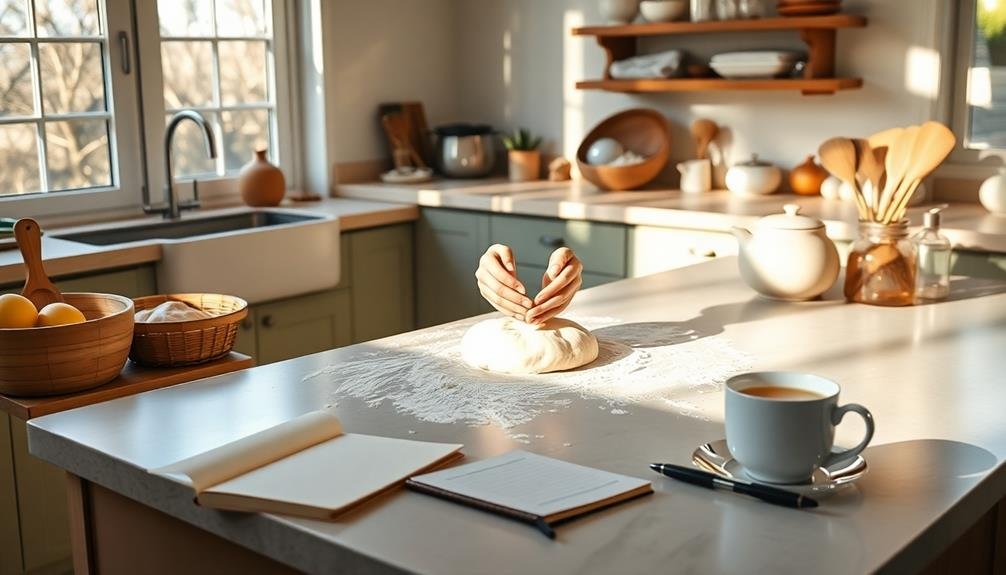
Gratitude can transform your baking experience into a mindful practice that enhances mental wellness. As you measure ingredients, mix batters, and shape doughs, take moments to reflect on the things you're thankful for. This practice can shift your focus from stress or worries to positive aspects of your life, promoting a sense of contentment and joy.
Incorporate gratitude into your baking routine by:
- Expressing thanks for each ingredient as you use it
- Appreciating the tools and appliances that make baking possible
- Acknowledging the skills you've developed over time
- Feeling grateful for the opportunity to create something delicious
As you knead dough or decorate a cake, let your mind wander to the people, experiences, and opportunities you're grateful for.
You'll find that this mindful approach not only improves your mood but also enhances your connection to the baking process. When you're feeling stressed or overwhelmed, baking with gratitude can serve as a form of moving meditation, allowing you to ground yourself in the present moment and cultivate a more positive outlook.
Slow Baking for Patience
Embracing slow baking techniques can be a powerful way to cultivate patience and mindfulness. When you engage in slow baking, you're forced to slow down, resist the urge for instant gratification, and focus on the present moment.
Start by choosing recipes that require longer preparation or baking times, such as sourdough bread, slow-fermented pizza dough, or overnight cinnamon rolls.
As you work through these recipes, pay attention to each step and resist the temptation to rush. Notice the subtle changes in texture and aroma as your dough rises or your cake bakes. Use this time to practice deep breathing or meditation, allowing yourself to fully immerse in the process.
Slow baking also teaches you to trust the process and let go of control. You can't rush a perfectly proofed loaf or a slowly caramelizing onion.
This patience translates into other areas of your life, helping you approach challenges with a calmer, more centered mindset. By regularly practicing slow baking, you'll develop a greater appreciation for the journey, not just the end result, fostering a more patient and mindful approach to life's challenges.
Sensory Engagement in Tasting
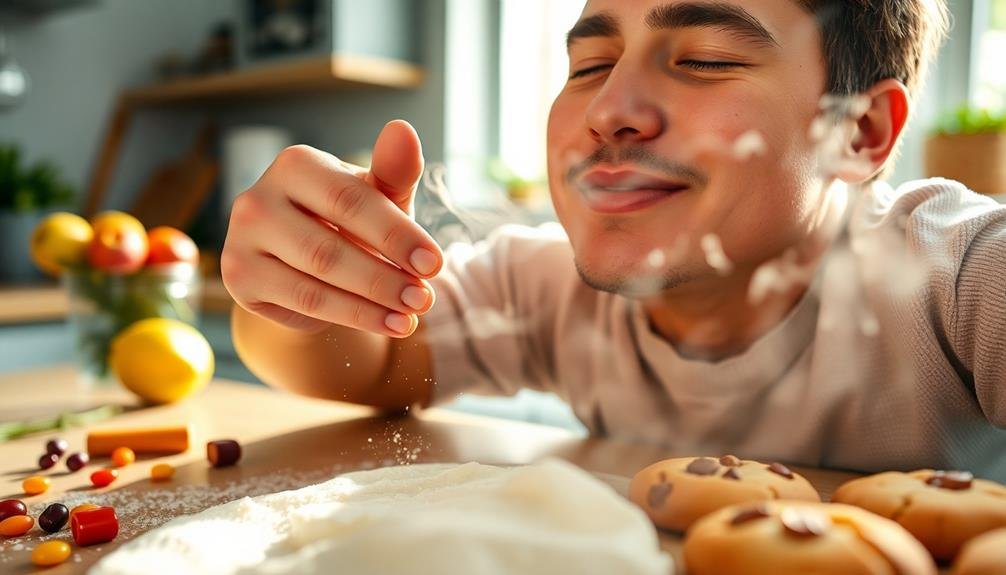
While slow baking hones your patience, the art of tasting engages all your senses, deepening your connection to the baking process. As you bite into your freshly baked creation, you're not just satisfying hunger; you're commencing on a sensory journey that can boost your mood and mindfulness.
To fully engage your senses when tasting, try these steps:
- Look: Observe the color, texture, and shape of your baked goods.
- Smell: Inhale deeply to appreciate the aroma before tasting.
- Touch: Feel the texture with your fingers and in your mouth.
- Listen: Pay attention to the sound as you bite or break the item.
As you taste, focus on the flavors, noting how they evolve on your palate. Is it sweet, salty, or tangy? Can you detect individual ingredients?
This mindful approach to tasting not only enhances your baking skills but also promotes present-moment awareness, reducing stress and anxiety. By fully immersing yourself in the sensory experience, you're practicing a form of meditation that can improve your overall mental well-being.
Sharing Baked Goods as Therapy
The act of sharing your baked goods can be just as therapeutic as the baking process itself. When you offer your creations to others, you're not just giving them a tasty treat; you're sharing a piece of yourself and your effort. This act of generosity can boost your self-esteem and create meaningful connections with others.
Consider these ways to share your baked goods:
| Method | Benefits |
|---|---|
| Family gatherings | Strengthens bonds, creates memories |
| Workplace sharing | Improves workplace morale, builds relationships |
| Charity donations | Helps those in need, provides sense of purpose |
By sharing your baked goods, you're extending the therapeutic benefits beyond yourself. It's an opportunity to practice kindness and empathy, which can greatly improve your mental well-being. You'll also receive positive feedback and appreciation, reinforcing your sense of accomplishment and self-worth.
Don't hesitate to share your baking creations, even if you think they're not perfect. Remember, it's the thought and effort that count. The joy you bring to others through your baked goods can be a powerful antidote to stress and anxiety, creating a positive cycle of giving and receiving that benefits everyone involved.
Frequently Asked Questions
Can Baking Therapy Help With Specific Mental Health Conditions Like Depression or Anxiety?
Yes, baking therapy can help with depression and anxiety. You'll find it calms your mind, boosts your mood, and provides a sense of accomplishment. It's a hands-on activity that encourages mindfulness and creative expression.
How Often Should One Engage in Therapeutic Baking for Optimal Benefits?
You should aim to bake therapeutically 2-3 times a week for ideal benefits. It's important to listen to your body and mind, adjusting frequency as needed. Don't overdo it; balance baking with other self-care activities.
Are There Any Risks or Precautions to Consider When Using Baking as Therapy?
You should be aware of potential risks like overeating or burning yourself. Don't use baking to avoid addressing serious issues. If you've got eating disorders or allergies, consult a professional before using baking as therapy.
Can Therapeutic Baking Be Incorporated Into Professional Mental Health Treatment Plans?
Yes, you can incorporate therapeutic baking into professional mental health treatment plans. It's an effective complementary therapy that therapists often use alongside traditional methods. You'll find it can enhance mindfulness, boost self-esteem, and provide a creative outlet.
What Are the Long-Term Effects of Regular Therapeutic Baking on Mental Wellness?
You'll likely experience improved mood, reduced stress, and enhanced self-esteem over time. Regular baking can boost your creativity, mindfulness, and social connections. It may also provide a sense of accomplishment and routine, contributing to long-term mental wellness.
In Summary
As you've explored these therapeutic baking tips, you've discovered a powerful tool for mental wellness. Remember, it's not just about the end product; it's the process that heals. Whether you're kneading dough, inhaling sweet aromas, or sharing your creations, you're nurturing your mind and soul. So next time you're feeling stressed or overwhelmed, don't hesitate to turn on the oven. Your kitchen isn't just for cooking; it's your personal therapy space.

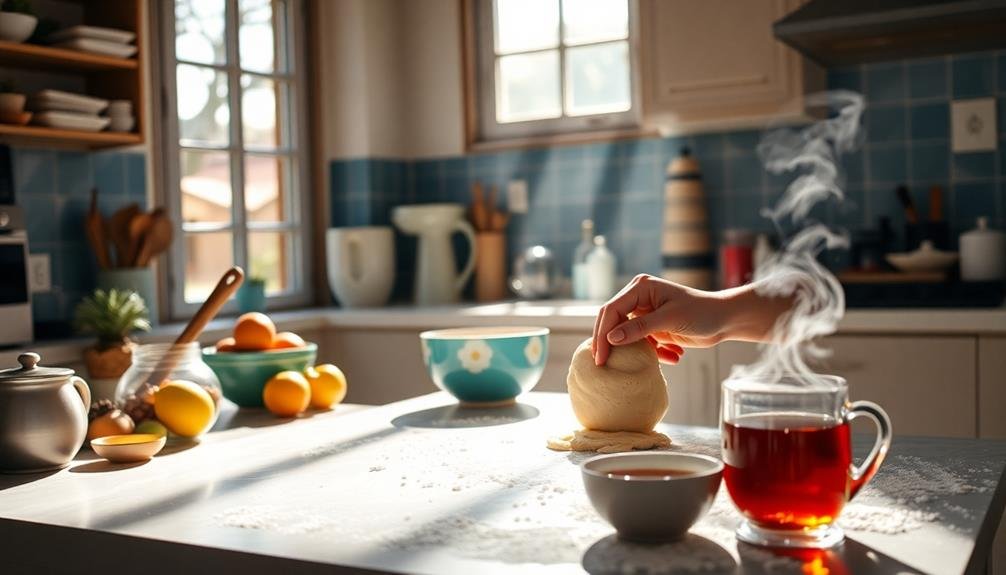
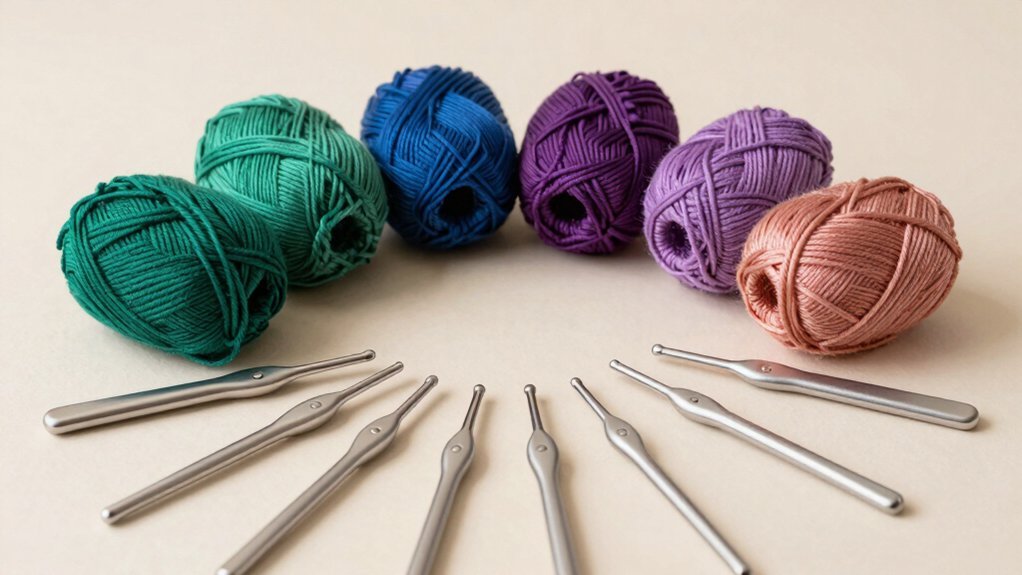

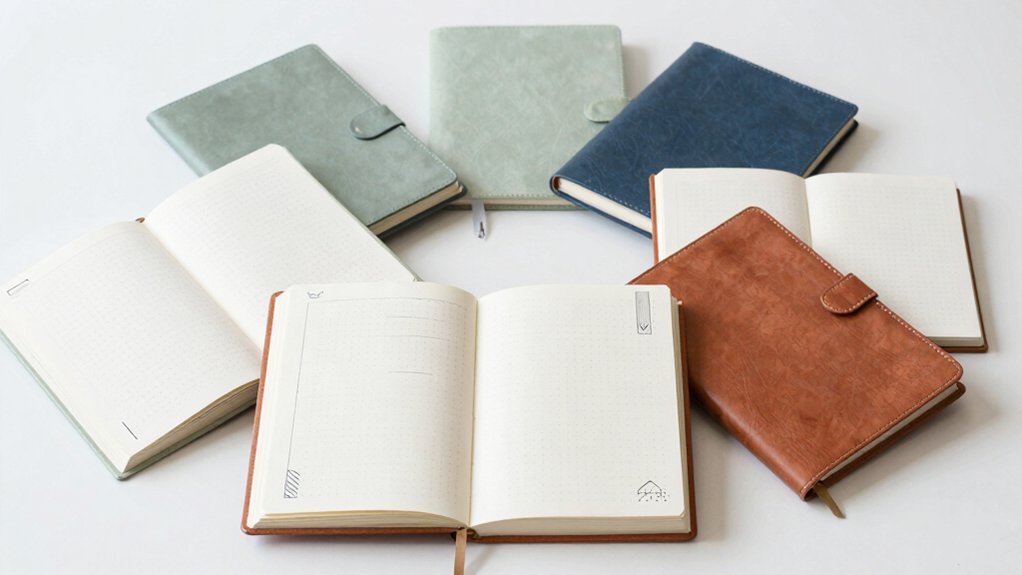
Leave a Reply